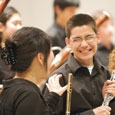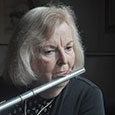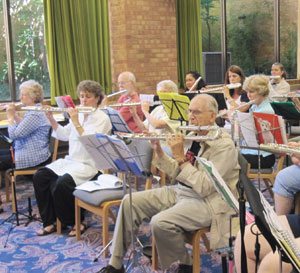
The summer after the fourth grade I traded my collection of 108 silver dollars for a Conn student model flute. A few days later my mother took me to Texas Tech to enroll in the six-week band camp. The person in charge didn’t want to enroll me because I was three years younger than the minimum age requirement, and I had never blown a note on the flute.
My mother explained she needed a place for me to be while she was in graduate school classes all morning. Fortunately Eugene Doche, the camp flute professor and San Antonio Symphony Principal Flutist, took pity on my beautiful mother and said, “I will teach your daughter.” Classes started the next day. At 9 a.m. I accompanied Mr. Doche to the beginning class, at 10 to the intermediate class, and at 11 the advanced class. At noon he gave me a 15-minute private lesson to answer my questions. During the afternoon I practiced and practiced. In six weeks I completed the entire Ernest Wagner book and was well on my way to a life-long love affair with music-making and the flute.
My story is not unusual among those who have attended a summer masterclass program; many of us have found that these exceptional experiences have changed our lives. For this roundtable discussion I invited five colleagues to share their stories of memorable summer masterclass programs.
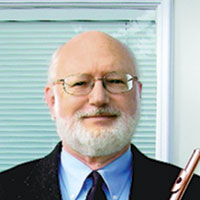 Jerrold Pritchard
Jerrold Pritchard
Jerrold Pritchard completed his bachelor’s and master’s degrees at California State University, Sacramento and a D.M.A. at the University of Washington. His principle teachers were Merrill Jordan, Edna Comerchero, Sid Zeitlin, and Felix Skowronek. He also participated in master classes by Julius Baker and Marcel Moyse. He taught for 12 years at the University of Northern Iowa and just recently retired as Professor of Music at C.S.U., San Bernardino, where he was also Associate Provost/ Vice President for Academic Programs for 25 years.
Having attended dozens of masterclasses taught by many well-known flutists and teachers, I believe that I have benefited from every one of them – even those that were badly organized or taught or that included students who were unprepared or not very advanced. In masterclasses students and performers can learn what not to do as well as what to do.
Some of the least valuable experiences were when the performer was so polished and perfect that there was little for the teacher to say. I distinctly remember two occasions when Geoffrey Gilbert and Louis Moyse simply said, “Well done. What else you have to play?” Though you obviously don’t want to embarrass yourself in a public setting, I have found that much is learned when the class performer is open to advice and can make the changes. It is best when they have learned the piece well but have not perfected it yet or solidified their interpretation.
One of my most rewarding masterclass experiences was when Moyse worked with a woman in her 60s who was almost a complete beginner. Someone had told her that, if she wanted to learn quickly at her age, she should go to the top players and teachers. She started lessons with Julius Baker. She then came to the legendary Moyse flute seminars in Brattleboro, Vermont after only six months of study! Moyse was so kind, understanding, and helpful to her. His instructions were precise and exactly matched to the needs of this beginning student. He guided her musically and technically and sent her on her way with good concepts and technical information about how to make the flute sing.
I learned another valuable lesson from one of the first people to play at the Moyse class. He was a very advanced and talented player who had actually not enrolled in the class; he just came for the day to show off for the great man. Not understanding Moyse’ emphasis on expression, accuracy, control, and faithful realization of the composer’s written instructions, this fellow played a very fast and technically impossible piece with blazing fingers, a great deal of rubato, and questionable intonation. About halfway through the piece, he must have begun to understand who he was playing for and realized how inappropriate his choice of music and style was. He began to falter, and then tremble, and finally stopped. Moyse looked up at him with a smile and simply said, “Now we begin.”
The wide variety of skill levels and backgrounds at the class made it very enjoyable and allowed Moyse to show the breadth and depth of his approach and perspective. The 25 or so members of the class became a supportive community that assisted and learned from each other rather than being a competitive group.
I had fortunately brought along a big box of ensemble music, and we spent evenings at the comfortable old lodge playing flute duets, trios, and quartets together, laughing and sharing our backgrounds and experiences with the flute. By the end of the masterclasses, we had become friends and dawdled chatting over meals, went swimming, hiking and exploring the area. I still keep in contact with many of them years later.
I only played twice for the class and was pleased to have done my best and been able to benefit from Moyse’ skillful and perceptive coaching. I have found that I benefit most from these types of group lessons from just listening attentively to others playing for the teacher and taking careful notes. I recently came across a long, detailed set of comments and quotations from Moyse that I made at that long ago class; I could still hear his voice, inflection, and wise advice in my mind. What memories!
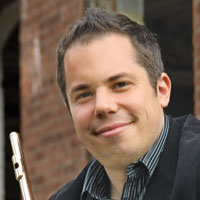 Conor Nelson
Conor Nelson
Conor Nelson gave his New York recital debut at Carnegie Hall’s Weill Recital Hall and has appeared as soloist with the Minnesota Orchestra and the Toronto Symphony Orchestra among numerous others. He is currently the Assistant Professor of Flute at Oklahoma State University.
While still in high school I attended the Julius Baker Summer Masterclasses in Danbury, Connecticut. At that time, Baker gave a three-hour class every day, and the sounds that came out of his flute were purely magical to me. I quickly realized, however, that I was behind some of my peers, and from that moment on, I knew that I would need to work very hard in order to make it as a musician. A wide variety of guest artists also gave classes there, and I gained exposure to musical and technical ideas that were revolutionary for me. They inspired me to practice even harder.
After one of my first performances in the class, Baker asked me where I was from. When I told him Toronto, he immediately lit up like a Christmas tree and said, “If you’re from Toronto, you simply must study with Susan Hoeppner.” I was familiar with her recordings and flattered that he thought I was ready. I remember leaving a message on Susan’s answering machine when I returned home that said, “Mr. Baker (her former teacher) recommended I study with you.” I am so thankful for that connection and the opportunity to study with her, as she will undoubtedly be a lifelong inspiration.
At the Baker classes I also had the opportunity to observe a class taught by Linda Chesis, who would later become my principal teacher at Manhattan School. One of her Manhattan students at the Baker class helped me set up my first lesson with her in New York. When the time for the lesson arrived, I took an overnight bus from Toronto to New York and had the lesson the next morning. It was a lesson that changed my life forever. Her innovative ideas about tone production, breathing, and style simply blew me away. When she picked up her flute and played, I knew I had to go to M.S.M. She helped me through some difficult transitions in undergraduate school and was always there for me every week. It’s possible that I never would have met her if it had not been for the Baker classes
Meeting serious flutists my age at the Baker classes also provided a new-found motivation. I met friends such as Mercedes Smith and David Buck, who now hold principal positions in the Pacific Symphony and the L.A. Phi n. I knew that flutists like Mercedes and David would be my competition for entrance to conservatories, so I worked harder upon my return to Toronto.
Mercedes and I ended up in the same freshman class together at the Manhattan School of Music and have been friends ever since. The opportunity to attend classes, festivals, and camps every summer for 12 years was a formative element of my musicianship. I also had a lot of fun!
.jpg) Wendy Rolfe
Wendy Rolfe
Professor at Berklee College of Music, Rolfe performs with the Handel and Haydn Society, Boston Baroque, New York’s Concert Royal, Toronto’s Tafelmusik, and in Latin America. She earned a bachelor of music degree from Oberlin Conservatory with Robert Willoughby and has masters and doctorate degrees from the Manhattan School of Music with Harvey Sollberger.
Playing Ravel’s Pavane, Bartok’s Rumanian Dances, and folk dancing amidst New Jersey cornfields are some of my most intense memories of the three summers I spent from ages 12 to 14 at the Appel Farm Arts and Music Center. My flute teacher and now dear friend, Jan Smith, was also the Center’s orchestra director (and swimming teacher). One summer, she challenged me to learn the first movement of the Mozart G-Major Concerto in two days, and I little realized that this was the beginning of a lifelong process.
Red Fox Music Camp in the Berkshire Hills followed with thrilling rehearsals of Brahms’ Second Symphony. I think that was when the Boston Symphony Music Director Erich Leinsdorf came to conduct us.
The next summer, before my senior year of high school, I inhaled, ingested, and became immersed in the French flute school at Jean-Pierre Rampal’s masterclasses in Nice, France. I lived with our family friends, the Cochereaus (Pierre Cochereau was then the Director of the Conservatoire in Nice and organist at Notre Dame) in their villa on the Mediterranean and rode my Mobilette (motorbike) to classes every day.
Only later did I understand how much I had learned by absorbing the French style in such intensive sessions. I remember working on the “Cantilena” from the Poulenc Sonata with Monsieur Rampal and having the opportunity to be coached on the Mozart Flute and Harp Concerto by Lily Laskine, the legendary harpist.
Then there was the summer as a Fellow at the Tanglewood Music Center. What a privilege to perform Wagner’s Tristan und Isolde with Leonard Bernstein, Stravinsky’s Rite of Spring with Seiji Ozawa, Bruckner with Klaus Tennstedt, and contemporary music with Gunther Schuller, while being coached by Doriot Anthony Dwyer. These summer music programs all profoundly changed my life, because I experienced making great music with great flutists and other musicians who took profound joy in sharing their art.”
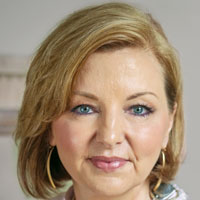 Susan Antonetti
Susan Antonetti
University of Arkansas at Little Rock, Professor of Music (Wind Ensemble Conductor and Flute) Susan Antonetti holds degrees from Arkansas Tech University and the University of Arkansas at Fayetteville. She has conducted bands at the middle school, junior high and high school levels. Her bands at Bryant High School earned state-wide, regional, and national acclaim. She plays Principal Piccolo with the Little Rock Wind Symphony.
After 18 years as a band director I retired and found myself returning to the instrument I fell in love with – the flute which had led me to band directing in the first place. The question was how to get back what I had as an undergraduate? The first thing I did was seek private lessons. That got me started, but it was workshops that rekindled the flame.
The first workshop I attended was a Flute Spa by Patricia George, and it changed everything I thought I knew about the flute. The next workshop I attended, however, sent the terrible message, “after a certain age, you might as well give up.” Fortunately the workshops that followed that one were amazing.
Seek out workshops that feature an artist who is also a great teacher. There are amazing flutists out there who have little or no interest in teaching and then there are the gifts to the flute world – teachers such as Patricia George, Keith Underwood, Christina Smith, Rhonda Larson, Helen Speilman, and Lea Pearson – to name just a few. I have learned more about the flute in the past two years of attending workshops led by these amazing artists/teachers than any other teaching I’ve encountered. While workshops require a financial commitment, think about not only what you get from them, but what you will be able to give to yourself and your students. I’m hooked on masterclasses and workshops.
Elizabeth Buck
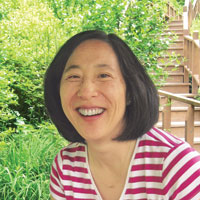 Elizabeth Buck is Associate Professor of Music (Flute) at Arizona State University. She holds degrees from Rice University and The Juilliard School. She has served as Principal Flute with the Phoenix Symphony, been a Visiting Associate Professor at Indiana University’s Jacobs School of Music, and taught at the Brevard Music Center.
Elizabeth Buck is Associate Professor of Music (Flute) at Arizona State University. She holds degrees from Rice University and The Juilliard School. She has served as Principal Flute with the Phoenix Symphony, been a Visiting Associate Professor at Indiana University’s Jacobs School of Music, and taught at the Brevard Music Center.
Summer programs and masterclasses are great opportunities to travel, see the world, and experience new teachers, concepts, ideas, and friends. In high school, I participated in the Boston University Tanglewood Institute orchestral program. It was an unbelievable experience to meet serious classical musicians from all across the United States.
At Tanglewood, I listened to the Boston Symphony, took weekly lessons with Lois Schaefer, and played and practiced all summer long in the orchestral program with renowned guest conductors. This solidified many skills I still use and teach to this day. In fact, I’m still playing and performing with some of the same friends I made that summer – over 25 years later. When I got the job with both the Phoenix Symphony and later, Arizona State University, I had the wonderful circumstance to reconnect with Lois Schaefer. Schaefer moved to Arizona upon retirement from the Boston Symphony, and then donated her entire personal music library to A.S.U. Studying with her during the summer at Tanglewood essentially paved the way to my professional career and life-long connections in music. You can’t really get any more life-changing that that.
